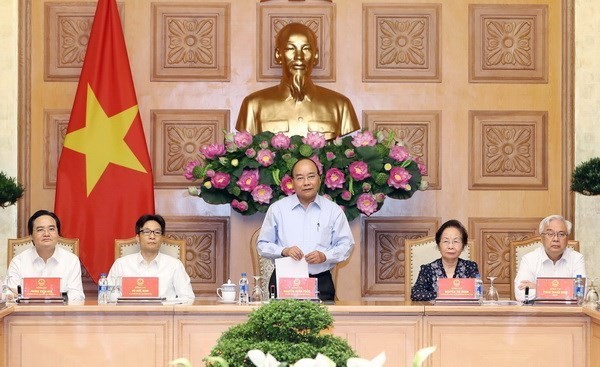
It was the first time PM Phuc, also President of the National Committee for Education Reforms and the National Council of Education and Human Resources Development from 2016 – 2020, chaired a meeting of this kind.
The meeting aimed to seek measures to translate Resolution No.29-NQ/TW dated November 4, 2013 on fundamental and comprehensive innovation in education, serving industrialization and modernization in the Socialist-oriented market economy into reality during the country’s international integration and the era of Industry 4.0.
The meeting focused discussion on reforms of the teacher training and allocation, renovation of textbooks, and improvement of the effectiveness of institutional autonomy of higher education in Vietnam. The meeting also saw many proposals to reform the accreditation procedures of professor and associate professor titles and to improve the quality of Vietnamese professors and associate professors.
PM Phuc spoke highly of all proposals at the meeting, saying the ultimate goal of the socio-economic development is to better serve people, particularly in education and training.
He agreed with the proposals to promote the application of technology in education and noted that the elimination of technological illiteracy is fundamental to developing E-government, smart cities and global citizens.
He also appreciated the ideas of lifelong learning, especially for old adults, to prevent stagnancy and uncreative and close-minded thinking at work.
He stressed on the importance of capacity building for teachers which is the key to the country’s educational reforms, asking for the restructuring of pedagogical institutions with the focus on the quality of teachers and benefits for them. He wanted the teachers to receive better training and be facilitated to absorb new ways of thinking.
The PM also requested the universities to further foster students’ start-up businesses, saying it is important to increase the Vietnamese’s productivity.
He required stricter accreditation of professors and associate professors and improvement of the quality of the candidates and judges to ensure transparency in line with international standards.
Regarding the university autonomy, the top leader said when the institutional autonomy is applied; the universities are only governed by the Ministry of Education and Training in terms of planning, examination, education quality and inspection. He asked for increase in the number of universities piloting autonomy instead of only three or four universities at the present to get feedback and scale up the model in the future.
He endorsed ideas of university autonomy in academic curriculums, organization and finance and emphasised that financial autonomy does not mean that the government will not invest in higher education institutions.
























